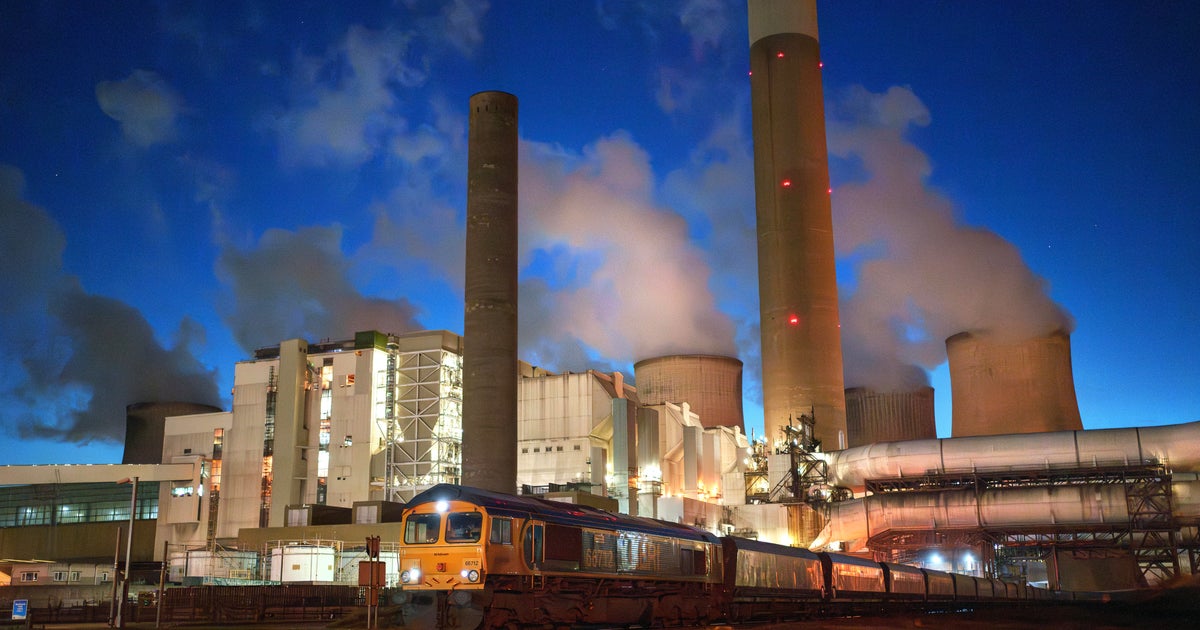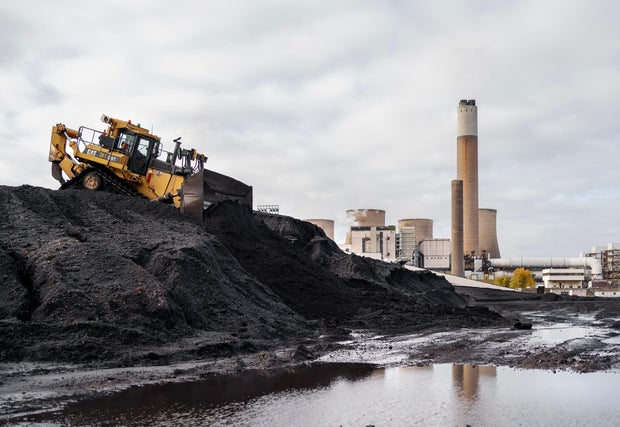CBS News
United Kingdom closes its last coal-fired power plant

The U.K.’s last coal-fired power plant was to close permanently on Monday — bringing an end to 140 years of reliance on the fossil fuel to generate electricity in Britain. The move will make the U.K. the first major global economy to completely phase out coal as an energy source.
The Ratcliffe-on-Soar Power Station, located near a small village in southern England, was to close its doors for the last time at midnight local time. The power station has been generating electricity since 1967 and “played a key role in keeping the nation’s lights on,” its parent company Uniper said in a statement Monday.
“Since commissioning it has produced enough energy to make more than 21 trillion cups of tea and its 2GW capacity is enough to power two million homes,” the company said.
UNIPER/Handout
Peter O’Grady, the plant’s manager, told CBS News it was “an emotional day.”
“When I started my career 36 years ago, none of us imagined a future without coal generation in our lifetimes. I am incredibly proud of what we’ve achieved together over the years and to be part of this energy milestone as the country focuses on a cleaner energy future,” he said.
The move sees the U.K. make good on one of the environmental pledges made by the government as part of a wider strategy to combat climate change and achieve net-zero greenhouse gas emissions by 2050. Coal is considered the single most damaging fossil fuel for the environment, according to Greenpeace, as it releases more carbon dioxide than oil or gas. Coal also produces mercury and arsenic, and small particles of soot which contribute to air pollution.
Thirteen countries have already phased out coal as a source of energy, according to independent climate think tank Ember, but Britain will be the only member of the G7 group of economically advanced, democratic nations to do so thus far.
In the G7’s largest economy by a significant margin, the U.S., the Department of Energy acknowledges that coal is still “used to generate a significant chunk of our nation’s electricity” — about 16% of the total share in 2023, according to the Energy Information Administration.
U.K. Energy Minister Michael Shanks said in a statement sent Monday to CBS News that the closure of the Ratcliffe power station “marks the end of an era, and coal workers can be rightly proud of their work powering our country for over 140 years.”
“The era of coal might be ending, but a new age of good energy jobs for our country is just beginning,” Shanks said.
UNIPER/Handout
The first coal plant in Britain went online in 1882, when Thomas Edison’s Holborn Viaduct coal plant started generating electricity for public use. It was a first-of-its-kind station, and it burned enough coal to provide energy to light 1,000 lamps in the City of London.
Despite efforts to make the industry cleaner, the fundamentals of coal-fired electricity generation have remained largely unchanged since Edison’s company fired up its boilers. The process involves burning the fossil fuel to heat water to create steam, which spins a turbine to produce electricity.
CBS News
Georgia’s six-week abortion ban ruled unconstitutional

Georgia’s six-week abortion ban is unconstitutional, Fulton County Superior Court Judge Robert McBurney ruled Monday, permitting abortions to resume later into pregnancies.
The order means the state can’t enforce the six-week ban that took effect in 2022. Abortions may continue to be performed until around 22 weeks of pregnancy.
“While the State’s interest in protecting ‘unborn’ life is compelling, until that life can be sustained by the State — and not solely by the woman compelled by the Act to do the State’s work — the balance of rights favors the woman,” McBurney wrote in his ruling.
When the Supreme Court overturned the landmark Roe v. Wade in 2022, Georgia was one of the states where a ban automatically kicked in at about six weeks, which is sometimes before a woman realizes she is pregnant.
This is a developing story.
contributed to this report.
CBS News
Can the Tim Walz, JD Vance debate shape the 2024 election?

Watch CBS News
Be the first to know
Get browser notifications for breaking news, live events, and exclusive reporting.
CBS News
Hurricane Helene flooding poses multiple health risks. Here’s what to know.

Hurricane Helene’s wake of massive rains and flooding isn’t just destructive to property — it is also a major health and safety risk, leaving residents in the storm’s path stranded and potentially exposed to waterborne illnesses and other dangers.
As authorities rush to airdrop supplies, restore power and clear roads, the number of storm-related deaths climbed past 100 across the Southeast.
In the devastated city of Asheville, North Carolina, Megan Drye, who was rescued, watched as her 7-year-old son Micah and her parents got swept away into the flood. They were stranded on a roof when it collapsed into the water.
Vulnerable populations, including the elderly, children and those with pre-existing health conditions, are particularly at risk for flood-related hazards, internal medicine physician Dr. Shoshana Ungerleider told CBS News.
But experts say there are a variety of health risks to be aware of when it comes to floodwaters. Here’s what to be mindful of.
Floodwater drowning, injuries and diseases
Even for skilled swimmers, swift flood waters can quickly sweep anyone and anything in its path.
“Unfortunately, we’ve seen a trend on social media of people dancing and jumping head first into Hurricane Helene floodwaters,” said Peter Duncanson, disaster expert at ServiceMaster Restore, adding this underscores hazards associated with engaging with floodwaters.
Aside from the water itself being dangerous, floodwaters can also conceal downed electric lines and open manholes or drains, Duncanson said. Floodwaters can also carry harmful debris that can lead to injuries like glass and metal as well as rodents and snakes.
Then there’s the dangers you can’t see with a naked eye like pathogens.
“Mostly we worry about what we call ‘enteric pathogens’ — the same kind of bacteria that cause food-borne illness, like certain strains of E. coli, salmonella, shigella and yersinia. We also worry about norovirus and hepatitis A,” Dr. Daniel Kuritzkes, chief of the division of infectious diseases at Brigham and Women’s Hospital, told CBS News.
If drinking water becomes contaminated, drink only bottled (or boiled) water until advised by local authorities that the water is safe to consume, Kuritzkes said.
“Remember that you need clean water to be able to wash fruits and vegetables, so either peel or cook those before eating if you’re unable to secure a safe water supply,” he said.
Open wounds or rashes exposed to floodwater can also become infected, Dr. Robert Glatter, an emergency physician at Lenox Hill Hospital in New York City, previously told CBS News.
Avoid direct contact with floodwater whenever possible by wearing gloves and waterproof clothing and never walk barefoot through a flood.
“Often if your feet get waterlogged that’s a set-up for getting infections, including fungal infections between the toes,” said Glatter. “Wear high boots and keep your feet as dry as possible.”
Health impacts beyond flooding
Once water recedes, mold is another major issue that can trigger asthma and difficulty breathing, watery eyes and allergy-type symptoms, said Dr. Peggy Duggan, executive vice president and chief medical officer at Tampa General Hospital.
“That is why it is important to remove all furniture and items as well as drywall to mitigate the risk of mold,” Duggan said.
Glatter said carpeting and fabric-based furniture should not be salvaged.
“Bacteria can leach onto fabrics and lead to airborne infections,” he said. “I would not recommend holding onto anything with fabric that absorbs floodwater.”
Mold can appear in as little as 24 to 48 hours after floodwater recedes.
Loss of power and no access to air conditioning are also health risks to be cautious of, experts say.
“The loss of power and no access to air conditioning can increase risk to patients who have chronic medical conditions like asthma, COPD (chronic obstructive pulmonary disease) and cardiovascular disease, and heart failure,” Duggan said.
Mental health after Hurricane Helene
It’s not just physical health that can be impact by the hurricane’s devastation — mental health is another concern.
“Surviving Hurricane Helene can have significant impacts on your mental health,” Courtney Morgan, a licensed therapist and founder of Louisville, Kentucky, based mental health therapy practice Counseling Unconditionally, told CBS News.
Feeling scared, hopeless or isolated may come up during or after a hurricane or another natural disaster, she said.
“Many people have lost everything in these disasters, including their homes and even loved ones. Experiencing grief is challenging regardless of the circumstances; however, trying to navigate grief in the midst of a natural disaster is exceptionally difficult, as you often do not have the means to prepare a funeral or other arrangements for your loved ones. Additionally, you may experience survivors guilt if they know that other people have lost their lives,” Morgan said.
Post-traumatic stress disorder, or PTSD, and anxiety are mental health concerns that frequently emerge after such catastrophic events, Ungerleider said.
“During a natural disaster crisis, prioritizing mental health is critical for overall wellbeing and resilience. It’s important to first recognize and manage stress reactions early,” she said, adding a few suggestions to support your mental well-being:
- Maintain routines as much as possible to “create a sense of stability amidst chaos.”
- Stay connected to loved ones when possible (either virtually or in-person) for emotional support and to reduce feelings of isolation.
- Seek professional help from a mental health provider if symptoms like persistent anxiety, depression, or sleep disturbances are overwhelming, she added.
contributed to this report.









